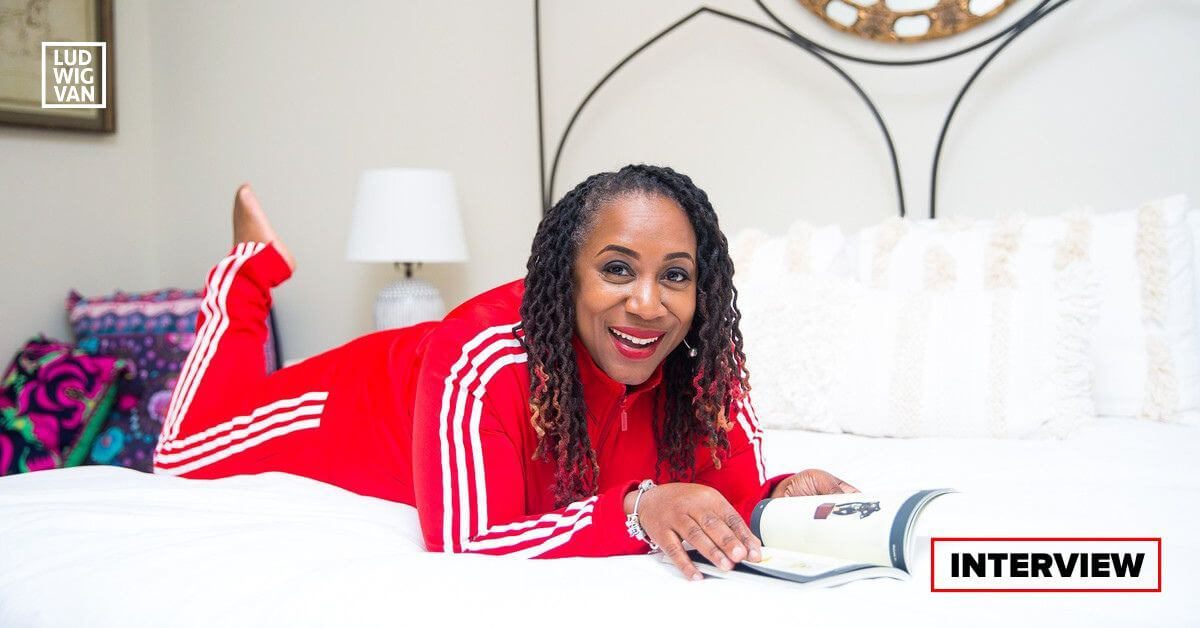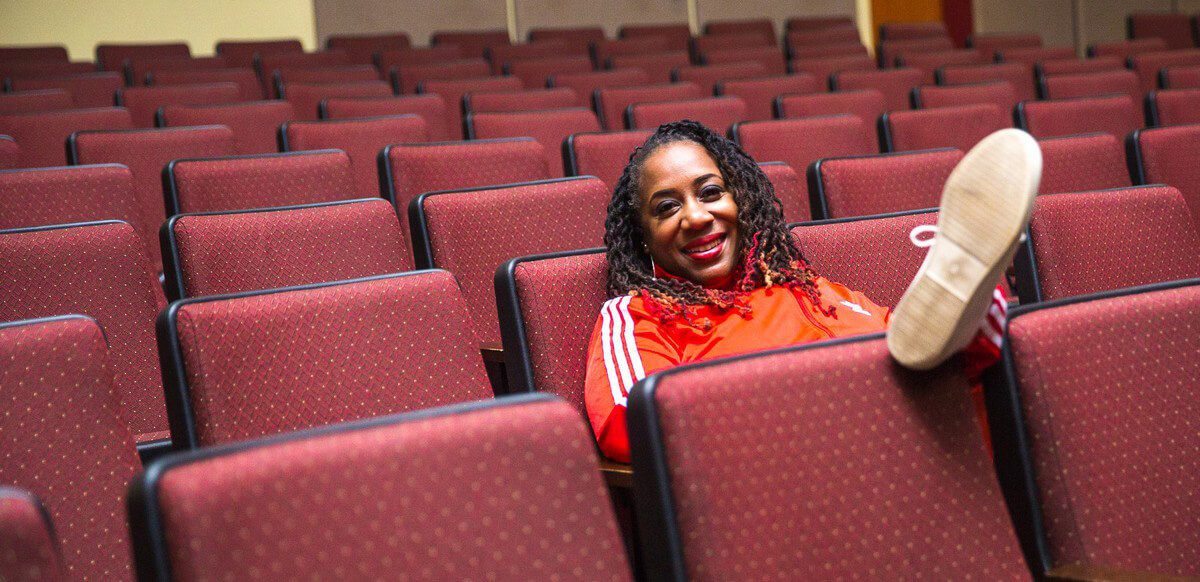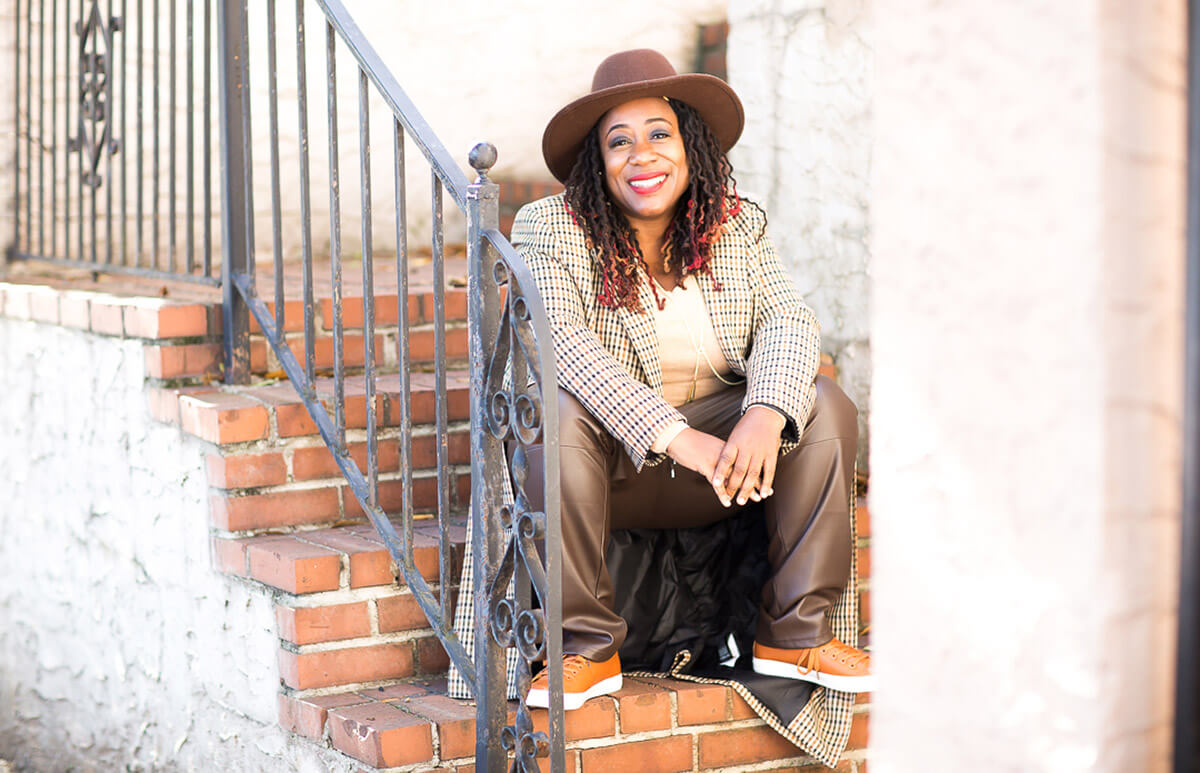
Trey Anthony, 39, describes herself as a “bad-ass Jamaican-British-Canadian, truth-teller, award-winning writer, and wellness expert”. Others see her as the “Oprah of Canada”. Her one-woman show, Black Girl in Love (with herself), is appearing at Harbourfront on July 31 and Aug. 1 as part of the Island Soul Festival.
Anthony’s accomplishments are the stuff of legends. Her 2001 play ‘Da Kink in My Hair was voted one of the top ten plays in Canadian theatrical history. She also oversaw the spin-off TV series of the play, which makes her the first Black Canadian woman to write and produce a TV show on a major prime time Canadian network. Her 2017 play, How Black Mothers Say I Love You, has been adapted into a movie and a possible TV series. Anthony is also an actor, a stand-up comedian, a theatre producer, a new mother to adopted son Kai, and an openly declared lesbian.
In the midst of her glittering career in the performance arts, Anthony found her calling as a motivational speaker. In fact, the subtitle of Black Girl in Love (with herself) is “a guide to self-love, healing and creating the life you truly deserve”. In this capacity, she controversially challenges the stereotype of the heroically strong Black woman.
Anthony and I connected by Zoom for a very candid interview.

I understand that your childhood was a rocky one.
The happy immigrant story is not mine. My mother left my brother and me behind in England with our grandparents, while she immigrated to Canada. I was 8. When she sent for us, I was 12. The same thing had happened to her. Her mother had left her in Jamaica for 6 years when she immigrated to England.
What happened when you came to Canada?
We lived in Rexdale, in Toronto housing, and it was a hard transition. I was also teased because of my British accent so there were assimilation problems. We were latch key kids because my mother had three jobs. I learned to “act” to fit in. I literally acted my way through school. I also wanted to be white. Because of the separation, it was awkward with my mother. We didn’t know her. When you don’t have emotional ties with someone, you feel lost. I believe I’m still recovering from that. It really changed me. My book and show Black Girl in Love came from that experience of trying to fit in.
But then you moved to Brampton and it was a different experience.
In fact, it was a class thing. We moved from working class Rexdale to middle and upper class Brampton which was very white and very Italian. I have clear memories of kids at school who got $10 a day lunch money, and were given cars on their 16th birthdays. There were very few Blacks at school. We filled only one table in the cafeteria. But it was a different experience, meeting Italians, Filipinos and Jews. It shaped how I move through the world.
Why did your mother move you there?
She wanted a better life for us. She wanted us to go to a good school and she believed the Catholic schools were the best. When I was in Grade 8, she transferred us out of the public school system, and we all lied and said we were Catholics.
Where did the writing begin?
I had a teacher at St. Dorothy, in Rexdale, who told me I was a writer, and that I had an amazing voice. I also perfected my comic timing at Notre Dame High School in Brampton. My grandmother had great comic timing too.
How did you become an actor?
Other than a 6-week course at the American Academy of Dramatic Arts in New York, I have no formal theatre training. I started in comedy and graduated to Second City and Yuk Yuk’s. I was part of a well-known sketch comedy show that featured first generation Canadians – the children of immigrant parents.
Let’s talk about ‘da Kink in My Hair that’s set in a Jamaican-style hairdressing parlour. What began as a fringe show went on to conquer the world. Where did the inspiration come from to write the play?
First, there were very few roles for Black women, and second, there were very few stories that reflected my culture. That’s why I wrote it.
The heroine is the owner Novelette. I just love that name. Where did it come from?
She was a real hairdresser who had a shop in the basement of her house. She came out to see the show.
And then you became a lifestyle coach.
I saw myself seeking approval in love and the approval of others, which I knew was wrong. I went through deep therapy while I figured out how to balance my life. I also saw that no one was talking to my generation of Black women. Black Girl in Love With Herself is an account of what I did to find myself, to heal myself, and after I wrote that, I found that women were asking for my advice, and telling me about their Black mothers, so I fell into being a wellness coach accidentally. I believe, however, it was my destiny to address the mental health needs of Black women. I also believe God wants me to do this. I’ve always been a spiritual person, so I guess all those Hail Marys rubbed off, but, first, being a queer person, I had to create what a higher power would look like to me. More to the point, acting and writing weren’t speaking to me in the same way anymore.
Wait a minute. I’m getting a bit confused about the book and the show. What’s the order of how things came about?
First there was the short journal or lifestyle planner called Black Girl in Love that I wrote in 2017, and self-published 500 copies which I sold from my website. It sold out. Then Hay House/Penguin Random House published the book Black Girl in Love (with herself) in 2021. The stage show came about because I felt cheated. Because of Covid, I didn’t get a book tour. When restrictions were lifted, and I asked for a book tour, I was told that that ship had sailed. In other words, I wanted a damn book tour, and I got ripped off by the pandemic. So, I bought back the book from the publishers, created the show, and produced it myself. When something’s important, I do it. People are used to my level of tenacity and audacity. You don’t look around for someone to do something for you. You do it yourself.
What is the actual show like? It seems to be more than just a motivational speech.
It’s not a regular comedy show or a routine book tour. I take a very creative approach. It is as if the book has come alive and is speaking to the audience in a mix of stand-up comedy and theatre. There is acting, dancing and motivational talk. The show incorporates all the things I love. It’s what I call the Trey Anthony brand, and people have told me that they have never seen anything like it before. The show has real depth.
Your book seems to be exclusively aimed at Black women, and not women in general.
I unapologetically write for Black women, but because I write from a place of truth, others will find themselves in my book. For example, it resonated with a Jewish women’s book club. Or there was the taxi driver who had left his family in Ukraine and he related when I told him about my immigrant experience and being left behind. The show resonated for a blonde White woman because, as she told me, she was the fat sister, and she always thought that her mother loved her less because of it. People will meet me where I’m at, so to speak.
Trauma seems to be an important factor in your message.
Like myself and my mother, many young girls have been left behind and that was an emotional trauma in my family and in theirs. Black women need healing around trauma. I talk to them about trauma. I tell them that this is the shit I’m trying to work through – a little girl in an adult woman’s body – and that healing yourself has no final destination. I give them the tools to recognize trauma, and that can make a big difference in their lives. I leave Black women with resources so they can cope. I also insist that for every show, 40 tickets must be provided free of charge for women in need.
One of your myth busters is poking holes in the stereotype of the strong Black woman.
That’s right. These strong women, like my mother and my grandmother, were in survival mode their entire lives, and surviving is not healing. To a Black woman, healing is a privilege. What White woman must get permission to be fragile? Strong Black women are denied the right to be fragile. That stereotype causes a lot of damage. We don’t have to be that stereotype. I feel I’m doing very important work by getting Black women to acknowledge this. There are conversations that need to be had in an authentic way. I tell my White friends, that to really be my friend, they have to acknowledge the trope of the strong Black woman, and the fact that that’s not me.
Where does race figure into the mix?
We must acknowledge that we all SEE race. American author and self-help activist Glennon Doyle has an adopted son who is Asian. She always thought of her son as white, and says that it never occurred to her that her whiteness could not protect him, but of course, everyone else sees him as Asian. It is a simple fact that my life is harder than that of a White woman because I am a Black woman. Even more so, my life is harder than straight Black women because I am a queer woman. When we toured Kink to Nunavut, I saw a whole other level of what race looks like. As a Canadian, I was embarrassed and ashamed at the treatment of Indigenous people. It was the most important show of the tour. The Nunavut audience got the bare bones message.
I can’t keep track of where you call home these days. For this Zoom call, you’re in Tampa.
I was living in Atlanta for a number of years, because that’s where my then-partner was. Since the break-up a year ago, I’ve been in Tampa with my mother and sister, but Toronto is my home. In fact, I’m looking for a permanent place to live there. I have three projects I’m working on in Toronto.

What was it like living in the Deep South?
Everyone thought I was socialist because I wanted to recycle. Recycling is optional in Atlanta and Tampa, and in Atlanta, it costs $10 a month to rent the recycle bin. Atlanta is right in the bible belt but, even though Tampa seems less conservative, you are still aware of the South. But on a good note, everyone is friendly and welcoming which is part of their charming Southern manner. You know your neighbours
Tell me about your son Kai.
He’s two, and he was born in Atlanta. I called him Kai because it means “ocean” in Hawaiian. It also means “new beginnings”. All my life I had devoted myself to my career, but I always knew I wanted a child, and now, I was running out of time because of my age. I also had fertility issues due to fibroids. Because I’m queer, I knew I wasn’t going to bed with a guy and getting pregnant, so I got Kai through a private adoption service. Private adoptions are not regulated in the States, so it’s really not ethical, but I still went ahead with it.
Do you have a relationship with the birth mother?
It’s an open adoption, and I have a friendship with the birth mother and the birth family. We call and exchange photos.
So what’s it like being a mom and a career woman?
Eye-opening, challenging and exhausting. I’m a solo mom by choice so I have to make it work. Kai is with me on this tour which means more stuff to do. It was difficult in Los Angeles, for example, because he was sick. Harbourfront is providing the babysitting service, but I’m not leaving my son with complete strangers, so I need to vet them, which means finding the time. On a lighter note, I can’t leave Kai with strangers wearing short pajamas he’s outgrowing, so I have to buy him a new pair to preserve his dignity. I’ve also decided that this is my last tour so I can be with Kai while he is growing up.
Why do you think you are such a popular speaker? You are invited everywhere.
I’m one of the best speakers around. That’s why I have a following. Men can boast and brag about their strengths, but women have always been encouraged to play small. I know what I can deliver.
You give other women advice, but what is the best advice that you ever received?
I was working with a life coach and bemoaning the fact that I had so many choices facing me. She said, Why do you have to choose? Just figure out a way to do them all, and that was the best advice I ever got.
****
Important note: Soulpepper and TO Live are joining forces to present the 20th-anniversary production of ‘da Kink in My Hair, Dec. 6 to 23, 2022, at the Bluma Appel Theatre.
#LUDWIGVAN
Get the daily arts news straight to your inbox.



